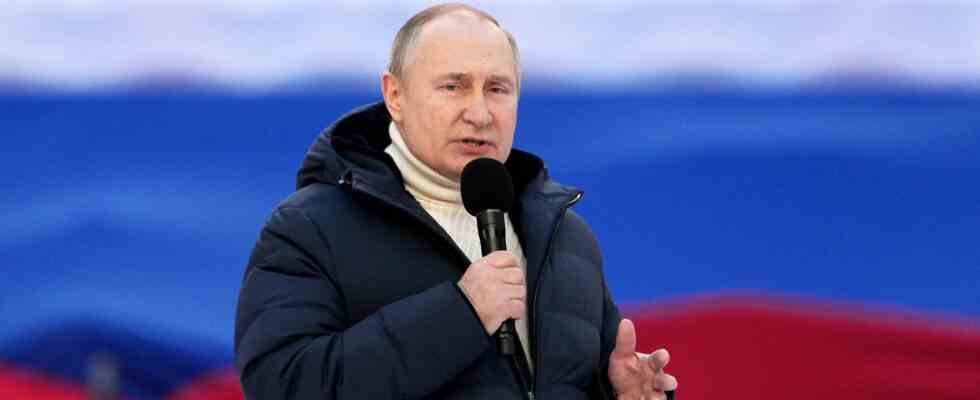Status: 03/23/2022 3:02 p.m
In the future, Russia wants to only allow payments for gas exports in its own currency. The announcement alone makes the ruble rise. Experts now fear an escalation in the “economic war”.
Customers in Germany and Europe will have to pay their bills for Russian gas deliveries in rubles in the future. He has decided to establish a package of measures to pay in rubles, Kremlin ruler Vladimir Putin said today during a televised government meeting. As a result, Russia no longer accepts payments in euros or dollars.
Accordingly, the “unfriendly states” held by Russia on a black list are affected. This includes Germany and all other EU countries, but also the USA, Canada and Great Britain. Putin gave the central bank and the Russian government a week to implement an appropriate payment system.
“Political signal”
Putin pointed out that the measure was a reaction to the freezing of Russian assets in the West. Gas deliveries would continue to be fully guaranteed, he assured. However, paying for Russian goods in foreign currency has lost its meaning. The West itself has devalued its currencies by freezing Russian assets abroad.
“First of all, Putin is sending a political signal,” said analyst Ralfcircul from the Landesbank Hessen-Thüringen. “Ultimately, it’s probably a tit-for-tat response to the sanctions imposed by the West.” The Russian government had already decided at the beginning of the month that its own financial obligations to “unfriendly states” would only be settled in rubles. These include Ukraine, Switzerland and Japan.
Ruble increases in value
“Furthermore, Putin’s measure supports the national currency, the ruble,” went on to explain. “If the gas bill is no longer paid in US dollars or euros in the future, that will of course support the ruble because it is in demand.” That could also benefit the ailing Russian economy. To what extent the liquidity on the ruble market is currently sufficient to pay all gas bills in the Russian currency is difficult to say, the expert added. “The market shouldn’t be particularly deep, because all Western countries are practically on the outside.”
However, the Russian central bank could theoretically print unlimited rubles and sell them to the gas-buying countries in exchange for foreign currency, although the exchange rate is questionable. “The Russian central bank will find a way to initiate this,” said Runde. The announcement by the Kremlin ruler promptly strengthened the Russian currency today, which has been under massive pressure since the beginning of the war in Ukraine and had fallen to historic lows.
In the afternoon, the ruble temporarily rose by 5.5 percent against the US dollar. The currency’s value is being bolstered in a manner similar to how the central bank would intervene in the FX market – which it is currently unable to do due to Western sanctions. When a central bank buys its own currency, it increases demand and reduces supply in the market. This increases the price.
“Economic War Escalation”
The economist Jens Südekum considers the change in the payment method to be an escalation of the economic conflict between Russia and the West. “This is an escalation of the economic war,” said the member of the scientific advisory board of the Federal Ministry of Economics Reuters. “Not many expected this broadside.”
For the expert, this represents a clear breach of contract. “There are long-term contracts for gas supplies that are denominated in dollars,” said the professor at the Institute for Competition Economics at Heinrich Heine University in Düsseldorf. “If Putin now declares that he only accepts rubles, he is breaking these contracts.” The West will now have to react in some way. “An embargo on energy imports from Russia has now become more likely.”
If the West followed Russia’s request, it would have to undermine its own sanctions over the war against Ukraine. Because the recipient countries would have to get the ruble from the Russian central bank. “But it was actually sanctioned,” said Südekum. “That’s why you can’t really do that.”
Russia warns of energy embargo
At the same time, Russia today warned the West of an oil and gas boycott. The global oil and gas markets would collapse if there were extensive sanctions against Russia in the energy sector, said Deputy Prime Minister Alexander Novak. “Russia is the largest provider.” In the oil sector, there is currently a bottleneck on the global markets of around one million barrels per day. Europe is threatened with diesel shortages, where stocks are at their lowest level since 2008.
The EU is considering further sanctions against Russia over Putin’s war of aggression against Ukraine. However, the foreign ministers had not found a consensus on this recently, and the heads of state and government of the 27 member states will meet on Thursday and Friday. The US and UK, which are less dependent on supplies from Russia, have already announced measures in the oil business.
Gas deliveries to Europe only against rubles
Christina Nagel, ARD Moscow, March 23, 2022 3:56 p.m

